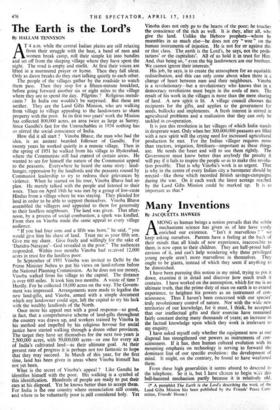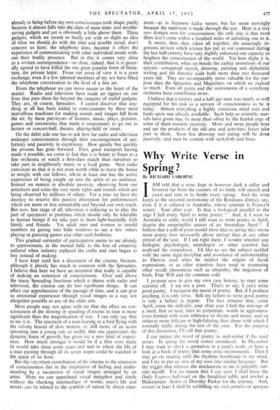Many Inventions
By 3ACQUETTA HAWKES MONG us human beings a notion prevails that the subtle mechanisms science has given us of late have vastly enriched our existence. " Isn't it marvellous ? " we keep asking ourselves. Parents have a feeling at the back of their minds that all kinds of new experience, inaccessible to them, is now open to their children. They are half-proud half- envious of it, and can't help wondering why these privileged young people aren't more marvellous in themselves. They ought to be giants, instead of which they seem if anything to be diminished.
I have been pursuing this notion in my mind, trying to pin it down, examine it in detail and discover how much truth it contains. I have worked on the assumption, which for me is an ultimate truth, that the prime duty of man on earth is to extend experience, to heighten his powers as an instrument of con- sciousness. Thus I haven't been concerned with our species' , truly revolutionary control of nature. Nor with the wide new territories of our knowledge, for it must, I think, be accepted that our intellectual gifts and their exercise have remained fairly constant during many thousands of years; an increase in the factual knowledge upon which they work is irrelevant to my enquiry. I have asked myself only whether the equipment now at our disposal has strengthened our powers as instruments of con- sciousness. If it has, then human cultural evolution with its mounting emphasis on technology is serving to forward the dominant line of our specific evolution : the development of mind. It might, on the contrary, be found to have weakened them.
From these high generalities it seems absurd to descend to the telephone. So it is, but I have chosen to begin w:t:1 this bell-haunted mechanism partly because it is relatively old, Co A pamphlet The Earth is the Lord's describing the work of the Land Gifts Mission has been published by the Friends' Peace Com- mittee, Friends' House.) already in being before my own consciousness took shape, partly because it almost falls into the class of mere time- and trouble- saving gadgets and yet is obviously a little above them. These gadgets, which we invent so busily yet with so slight an idea of what we should do with the time and trouble saved, don't concern us here; the telephone does, because it offers the experience of communicating with other individual minds with- out their bodily presence. But in this •'it comes very close to a written correspondence—so close, indeed, that it is gener- ally agreed to have killed the one great popular form of litera- ture, the private letter. From our point of view it is a poor exchange, even if a few talented members of my sex have lifted the telephone conversation to the level of a fine art.
From the telephone we can move nearer to the heart of the matter. Radio and television have made an impact on our lives that puts them far beyond the category of useful gadgets. They are, of course, Spreaders. I cannot discover that any- thing at all has been added to consciousness by these most marvellous machines for making sounds and images fall from the air, by these purveyors of lectures, music, plays; pictures, games and ceremonies that made it unnecessary to go out to lecture or concert-hall, theatre, playing-field or street.
On the debit side one has to ask how far radio and television endanger consciousness through their encouragement of uni- formity and passivity in experience. How quietly but quickly the process has gone forward. First, good transport having made it possible, we come to feel that it is better to listen to a fine orchestra or watch a first-class match than ourselves to take part in neighbourly music or a local game. Next radio convinces us that it is not even worth while to leave the house to mingle with our fellows, where at least one has the active experience of being caught up into the .spirit of an audience. Instead we remain in absolute passivity, observing from our armchairs and sofas the very same sights and sounds which are being observed by millions of others. For a time we have the decency to reserve this passive absorption for performances which are more or less remarkable and beyond our own reach. But now, last stage of all, television is inducing us to play the part of spectators in pastimes which should only be tolerable to human beings if we take part in them light-heartedly With family and friends. Yet adult men and women in untold numbers sit gazing into little windows to see a few others playing at guessing games and other such fooleries.
This gradual surrender of participation seems to me already to approximate, in the mental field, to the loss of creativity suffered when industry replaced the crafts and men began to buy instead of making.
I have kept until last a discussion of the cinema, because, although it plainly has much in common with the Spreaders, I believe that here we have an invention that really is capable of making an extension of consciousness. Over and above the many Spreading functions which it shares with radio and television, the cinema can do two significant things. It can affect our apprehension of the passage of time, and it can give us emotional experience through visual images in a way not altogether possible to any of the older arts.
Most people may not agree with me that the effect on con- sciousness of the slowing or speeding of events in time is more significant than the magnification of size. I can only say that to me it is. The spectacle of a man leaping or a bird flying with the velvety leisure of slow motion, or, still more, of an acorn sprouting into a young oak so swiftly that one appreciates the dynamic force of growth, has given me a new kind of experi- ence. How much stronger it- would be if a film were made (it would take three score years and ten) in which the life of a man passing through all its seven stages could be watched in the space of an hour.
But the important contribution of the cinema to the extension of consciousness lies in the inspiration of feeling and under- standing by a succession of visual images arranged by an artist. Here we can apprehend visual metaphor and simile without the checking intermediary of words;. man's life and moods can be related to the symbols of nature by direct state- ment—as in Japanese haiku verses, but far more movingly because the statement is made through the eye. Here is a tiny new domain won for consciousness; the only pity is that most films don't come within a hundred miles of admitting one to it. It seems, then, that, taken all together. the amazingly in- genious devices which science- has put at our command during the last half-century have very. slightly enhanced our capacity to heighten the consciousness of the world. Yet how slight it is, their contribution, when set beside the earlier inventions of our species—conceptual speech, drawing, painting and alphabetic writing and the diatonic scale both more than two thousand years old. They are incomparably more valuable for the pur- pose than the Spreaders and Magnifiers on which we expend so much. Even oil paints and the instruments of a symphony orchestra have contributed more.
I believe that a century and a half ago man was nearly as well equipped for his task as a servant of consciousness as he is today. Almost everything a highly conscious mind uses and feeds upon was already available. Such help as scientific mar- vels have given may be more than offset by the fearful urge of some of them towards passivity. More and more people hear and see the products of the old arts and activities; fewer take part in them. Soon fine dressing and eating will be done passively, and men be content with sackcloth and buns.



































 Previous page
Previous page